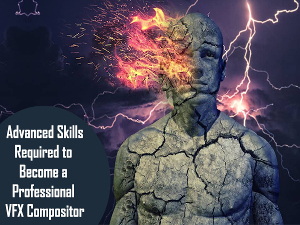
Skills Required To Become a Professional VFX Compositor
Becoming a professional in VFX can be a daunting task. It takes a lot of hard work, training, and experience to get there.
But if you're willing to put in the time and effort, you'll find that working as an artist within this industry is an incredibly rewarding career.
How to Become a Professional VFX Compositor
Step 1: Get the Facts about VFX
You are ready to begin your journey into the world of VFX. Now, you might be wondering what exactly VFX is or how it works. Well, let's start by taking a look at the definition of Visual Effects (VFX).
Visual effects (also known as special effects) are the process of creating illusions of things
that do not exist in real life by using a computer and other equipment such as green screens and blue screens. This can include anything from creating explosions in space to putting animals into scenes where they don't belong!
The different types of visual effects
include animation, compositing, digital matte painting, rotoscoping and wire removal;
these all fall under the category known as compositing which involves combining two
or more images while removing unwanted elements like wires and rigs from them!
Now that we know what makes up this necessary part when creating imaginary worlds on the screen
you're probably wondering if there's any work out there for people trying to break into this industry.
Step 2: Research VFX Training Programs
Now that you know what to look for, it's time to start exploring the many options. Here are some good places to start your research:
- Check out the best VFX training programs. Look for schools with a good reputation and a course curriculum that focuses on professional-level skills. These programs may be more expensive, but the investment will pay off in terms of your salary down the road.
Step 3: Choose a Specialty
This is the most important step and will make or break your career, so give it some thought. Choose a specialty that you are passionate about, but also that is in demand. You want to choose something that will allow you to work with people you enjoy,
who are talented and have similar interests as yourself. You can start by doing this for free,
then try applying for jobs once your portfolio has enough good examples of work from each specialization.
If there’s anything else I can help with please don't hesitate to ask!
Step 4: Gain Experience through an Internship
If you’re just starting, an internship can be a good way to get some experience and learn about the industry. It allows you to work closely with professionals in your field for a few months, which is an invaluable opportunity for any aspiring VFX artist.
Many studios offer internships on their websites or in job listings on sites like LinkedIn. While they may not always be paid positions,
they can lead to full-time employment if you do well enough during your internship.
Internships usually last between three and six months, but this depends on
whether or not the studio has regular openings available after yours is over (if they don’t need more interns). If you want something longer than six months, ask about it when applying for an internship position
Step 5: Accept a Job in Compositing
There are a couple of places to find a job in compositing. The first is to network with other compositors and artists,
as they're likely to be aware of any openings in the industry or know someone looking for help who could hook you up. The second option is applying directly to companies that need your expertise—but this is not as easy as it seems.
The best way to get hired is through networking and building relationships with those who are already working in the field,
so start by finding fellow VFX artists or anyone who might be able to give you advice on how to become an FX Compositor.
Becoming a VFX professional comes from hard work and dedication.
The VFX industry is a competitive one, and the only way to become a professional in this field is with hard work and dedication. To be successful as a VFX artist, you must be passionate about what you do. You need to have a strong focus on your work so that it can become an integral part of your life. You also need patience and perseverance to ensure that you can finish all of your projects perfectly every time.
Advanced Skills Required to Become a Professional VFX Compositor
A VFX Compositor is a 3D artist saddled with the job of creating realistic effects by combining live-action and computer-generated images to form a believable scene. A VFX Compositor is the most talented person that would work on a VFX film or a tv commercial that makes use of a lot of visual effects. Read 8 Skills Needed to Become a Professional VFX Compositor.
8 Skills Needed to Become a Professional VFX Compositor
Becoming a VFX compositor would need some form of formal education like attending an animation academy and training in VFX or following a VFX course. However, just like any skill, classroom education alone would not make an exceptional VFX Compositor. KSHITIJ VIVAN Ahmedabad offers the best VFX training to students and also helps them to get the best job placements according to their skills and talents to get the best start in their Professional Careers. Here are some skills needed to become a professional VFX compositor by a student who intends to be a sought-after VFX compositor. Below we have described a few of them.
1. Detail Orientation
The more detail-oriented a student is, the there are more chances of the student succeeding as a VFX Compositor. Being detail-oriented is all about being informed of the small drops that make the mighty sea as against just taking in the big picture at surface level. Being Detail oriented involves double-checking your work, every frame, every light information, every render pass, every angle, and every shadow. You have to be able to see what the watcher would not look at at a single glance.
2. Photography
To become a professional VFX Compositor, you have to understand how the camera works and how camera images differ from molded images. You have to understand the camera sensors, camera exposure, aperture, depth of field, shutter speed, camera lens focal length and aperture, camera autofocus, white balance, sharpness, image noise, bit depth, sensor sizes, and dynamic range.
Also, you need to understand how digital cameras differ from the human eye and how camera sensor sizes influence photography. The more in-depth a student knows about photography, the better his chances of being a good VFX Compositor.
3. Photographic Eye Training
You need to have a photographic eye to visualize the flow of images in the best possible way, and you need to be able to visualize the level of contrast, light, color, and most importantly the framing of the scene to become a professional VFX compositor. A lot of VFX compositor work is executed based on visualization, and references are not complete enough to include information on most parts that make up a scene such as color and light, all these are left for the VFX compositor to visualize.
4. Rules of Composition
Many of rules apply to composition, all of which a VFX compositor must be familiar with. Such rules include the rule of thirds, leading lines, symmetry, and patterns, balancing elements, viewpoint principles, background, framing, depth, and cropping. Every composition work would depend on most of those principles and rules to be realistic and believable. The rules of composition are the primary determinant of composition quality.
5. Color Theory
Color theory is a body of useful guidance for color mixing and the VFX of a specific color combination. Due to contrasts, most color effects are on three relevant attributes that define all colors:
Lightness: The degree of white or black in a scene, in other words, the degree of light or darkness in a scene.
Saturation: The quality of color in a scene, the dullness or the intensity of a color.
Hue: Hue is the main properties of a color, defined as “the degree to which a stimulus can be defined as similar to or different from stimuli that are described as red, blue, green and yellow. Hue is determining the amount of red, blue, green, and yellow in a particular color that makes up the color. Based on the color theory, these colors would be classified into primary and complementary colors, achromatic colors, warm and cool colors, shades, and tints. Other vital issues like color mixing, color harmony, color field, additive colors, color wheel, and color scheme would be discussed. A VFX Compositor needs to be well informed the color theory.
6. Cinematography
Cinematography is important for a VFX Compositor just like photography. Cinematography is the art or science of motion picture photography it is the technique of movie photography, which includes both the shooting and development of the film. The cinematographer could be referred to as the film director’s main visual collaborator. Mastering the features of cinematography such as image sensors and filters, film stock, lens, depth of field and focus, framing, aspect ratio, lighting, and camera movement would create strong support for a VFX Compositor.
7. Software Tool Mastery
VFX compositing requires the use of compositing software tools, while most of the compositing software such as Fusion, Nuke, Photoshop and After Effects, and composite all seem to have tool similarities. A VFX Compositor needs to be very familiar with the compositing software of choice and master these software tools. Just knowing the underlying mathematics of compositing, having a photographic eye, and color theory without mastering the compositing tools with which you would be required to display all the relevant knowledge would still eventually become a wasted effort.
8. Excellent Work Ethics
In this Multimedia Industry, one sign of a good VFX Compositor is his excellent work ethic. No matter how developed a VFX compositor is, his work ethic would still either move him or truncate his profession. Being a good team player, learning to take criticism, meeting deadlines, keeping communication lines open, working with low supervision, managing stress, and originality are just a few of the work ethics required for a VFX Compositor, and indeed anyone working in this animation industry.
KSHITIJ VIVAN is an authorized training partner of KSHITIJ VIVAN Ahmedabad CG Road and Satellite Road. Students from different cities such as Himmatnagar and Sabarkantha come here to join KSHITIJ VIVAN Animation courses.



